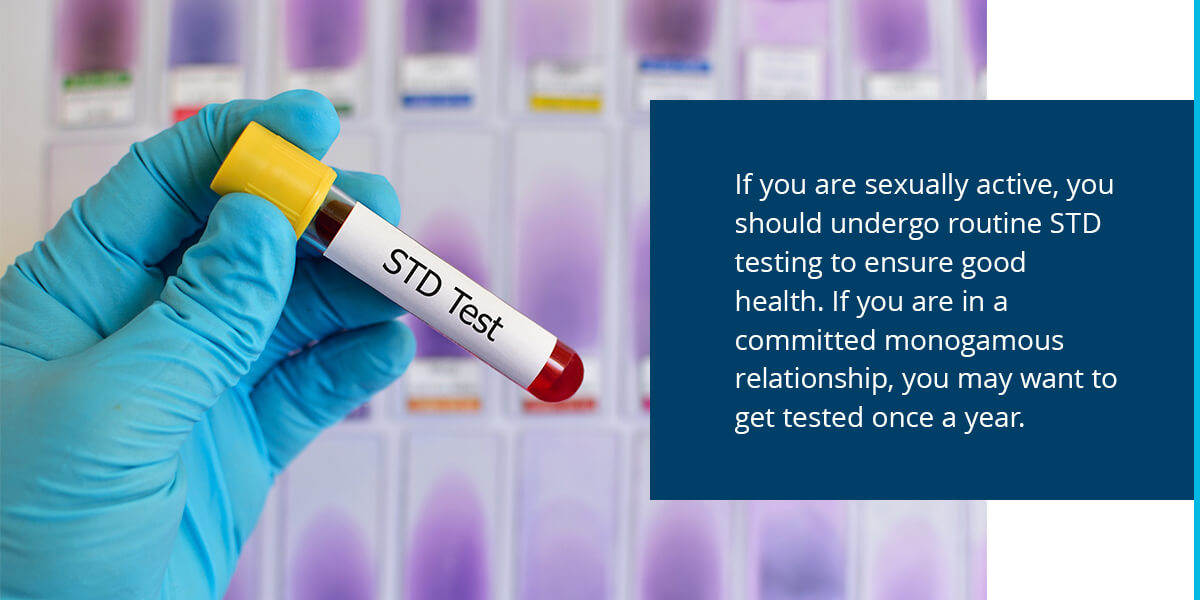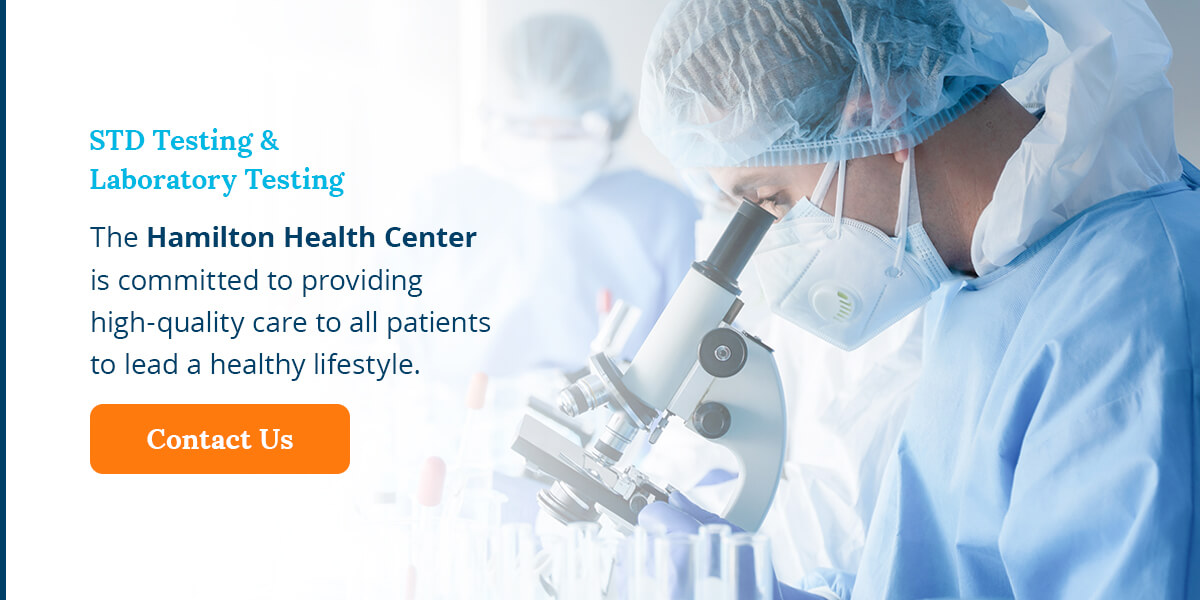Sexually active individuals should practice safe sex to reduce the risk of spreading sexually transmitted diseases. STDs can be transmitted through various sexual acts, including vaginal, anal and oral sex. Fortunately, STDs are easily prevented by practicing safe sex and using contraceptives and other forms of protection. Additionally, routine STD testing can ensure the health of sexually active individuals.
How Do STDs Spread?
The term STDs refers to sexually transmitted diseases, meaning, in most cases, they spread through sexual intercourse. STDs are one of the most common contagious diseases, with more than 1 million sexually transmitted infections occurring each day worldwide. STDs and STIs spread through oral, vaginal or anal sex.
While some people may think you have to have intercourse to contract an STD, some STDs can spread from skin-to-skin contact, including herpes and human papillomavirus (HPV). While STDs can affect anyone sexually active, they disproportionately occur in younger populations. People between the ages 15 to 24 account for half of all new STD cases, despite this group representing only 25% of the sexually experienced population.
An STD or STI is a serious illness that requires medical attention and treatment. Fortunately, many STDs can be treated and cured. On the other hand, certain STDs, such as herpes or human immunodeficiency virus (HIV), are treatable but not curable. Learning how to protect yourself from STDs is of the utmost importance to remain healthy and safe.
While most STDs occur due to oral, vaginal or anal sex, one sexually transmitted infection can occur through other means. Trichomoniasis, an STI transferred through parasites, can pass through wet clothing or moist towels previously used by a person infected with trichomoniasis. This occurrence is rare, but it can happen. Although it can spread through non-sexual means, trichomoniasis is still most commonly spread through direct sexual contact.
Condoms and other forms of contraceptives can help protect you during intercourse. Those with more than one sexual partner or who have sex with someone who has multiple partners are often at a higher risk of contract an STD or STI. Other high-risk behavior includes not using contraceptives, sharing needles with intravenous drug users or having intercourse with people that you do not know their sexual history.
Common STD Myths
Being informed and educated about various STDs and how they spread can help you learn how to stay safe and protected during sex. Unfortunately, there is a lot of misinformation and myths circulated about sex and STDs, potentially increasing the risk of STD transmission if people are unsure how to protect themselves while having sex.
Can You Get STDs From Kissing?
Kissing is generally a low-risk activity, especially when compared to oral, vaginal or anal sex. However, it is possible to transmit herpes, syphilis and cytomegalovirus (CMV) through kissing. While CMV is present in the saliva, syphilis and herpes are transmitted from direct skin-to-skin contact, especially when sores are present on the lips or surrounding the mouth. Overall, kissing is a safer, low-risk activity, especially if no visible sores are present.
Can You Get STDs If Both Partners Are STD Free?
If two partners do not have any STDs or STIs, they cannot transmit an STD to one another. Two STD-free people can’t transfer an STD to one another, as one partner must have an STD or STI to transmit it. However, many partners may think they both are STD-free, leading some couples to have unprotected sex, resulting in an STD.
Even if a partner got tested within the last few weeks or months, they still might have an STD, especially if they have had another partner since being tested. Certain STDs do not show up right away on an STD test. For example, chlamydia, gonorrhea or syphilis may show up on a test within days or weeks. On the other hand, HIV may take approximately three months to show on an HIV test.
Can You Have an STD And Not Pass It On?
If your partner has an STD, there is always a possibility it may be transmitted to you, especially if you have unprotected sex. However, there is no STD that will be transmitted every time a person has sex. While STDs are not transmitted every time you have sex, there is always a possibility they can be transmitted any time you have sex. Numerous factors affect the likelihood an STD may be spread, including length of intercourse, STD type, type of lubricant used and more.
Will I Be Judged for Getting an STD Test?
Medical professionals receive training that teaches them not to judge patients who have STDs. Unfortunately, not all doctors follow this advice. However, many providers who openly advertise their STD testing services do not judge patients for getting tested. If you worry about judgment, try to find a provider that clearly says they don’t judge you when they describe their services.
No matter what, treating your STD is much more important than not getting judged. Remember that having an STD is not a moral failing — it is just a medical condition like having a broken arm.
Can You Wear Two Condoms for Protection?
A condom is an effective form of contraceptive that is 98% effective at protecting against numerous STIs and STDs. Because of this, some people may think wearing two condoms will provide an extra layer of protection. Unfortunately, wearing more than one condom can have the opposite effect and decrease effectiveness.
When you wear two condoms, the amount of friction can cause the condoms to break and begin leaking. Wearing one condom is safer and much more effective than layering up on these contraceptives. It is essential to use a condom correctly and consistently to prevent the transmission of various STDs and STIs.
Can You Get STDs From Oral Sex?
Some people may believe abstaining from vaginal and anal sex and only performing oral sex will protect them from STDs. Many STDs can spread through oral sex, including syphilis, chlamydia and gonorrhea. To protect yourself during oral sex, you should use a dental dam, condom or another barrier contraceptive to reduce the risk.
Why Is STD Testing Important?
The CDC estimates that about 19 million new cases of STDs happen every year. Since many STDs don’t have obvious symptoms, getting tested is the best way to find out if you have one. Knowing if you have an STD lets you treat your disease and protect yourself and your sexual partners. While STDs seem scary, you can get a diagnosis and treatment for many of them easily. You just need to take the first step.
How Often Should You Get Tested for STDs?
If you are sexually active, you should undergo routine STD testing to ensure good health. If you are in a committed monogamous relationship, you may want to get tested once a year. On the other hand, if you have multiple sexual partners within a year, you should get tested more frequently, at least every three to six months. In general, you should get tested every time you have a new sexual partner.
If you have sex with multiple partners or display any symptoms of an STD or STI, you may want to get tested. To test for STDs, your doctor may need to take a urine sample, blood or other fluids. Because some STDs may not show on a test immediately, it is vital to get tested regularly. If you have any abnormal symptoms, it is best to check with your doctor and get tested to be safe.
STD Treatment
The treatment you may need depends on the type of STD or STI you may have. Depending on the STD, treatment may be able to improve symptoms and prevent flareups from occurring. Additionally, some STDs and STIs can be cured with proper treatment. It is important to note, even if you are receiving treatment for an STD, you may still transmit the STD.
While treatments vary depending on the STD, some of the most common treatments include antiviral medications, antibiotics, topical lotions and creams. Antiviral medications can help treat infections, such as HIV or herpes, and prevent flareups. Some antiviral medications can even suppress HIV for a lifetime. Antibiotics are also a common STD treatment often used to treat gonorrhea, trichomoniasis, chlamydia and syphilis.
When on antibiotics, it is best to avoid sexual intercourse until the entire treatment is complete and has effectively treated the STD. In some cases, a doctor may prescribe a cream or lotion to improve sores or lesions. If you believe you may have an STD or STI, you should contact your doctor immediately to get tested and talk about potential treatments.
How Do I Talk to My Partner About STD Testing?
If you have a sexual partner, getting tested together will help you prevent spreading an infection back and forth. However, you might feel nervous about talking to them about it. Let them know you’re asking because you want to stay healthy, not because you think they’re “dirty.” Don’t let your partner pressure you to have sex with them if they don’t want to talk about sexual health with you.
STD Testing in Pennsylvania
The Hamilton Health Center is committed to providing high-quality care to all patients to lead a healthy lifestyle. Our team offers the highest level of health care in a family-friendly, multilingual environment. We are proud to offer many services, including adult medicine, pediatrics, women’s health, teen health and more. Our goal is to help all patients receive regular primary care and achieve better health outcomes. To learn more about our health center, contact us online or call (717) 232-9971.





